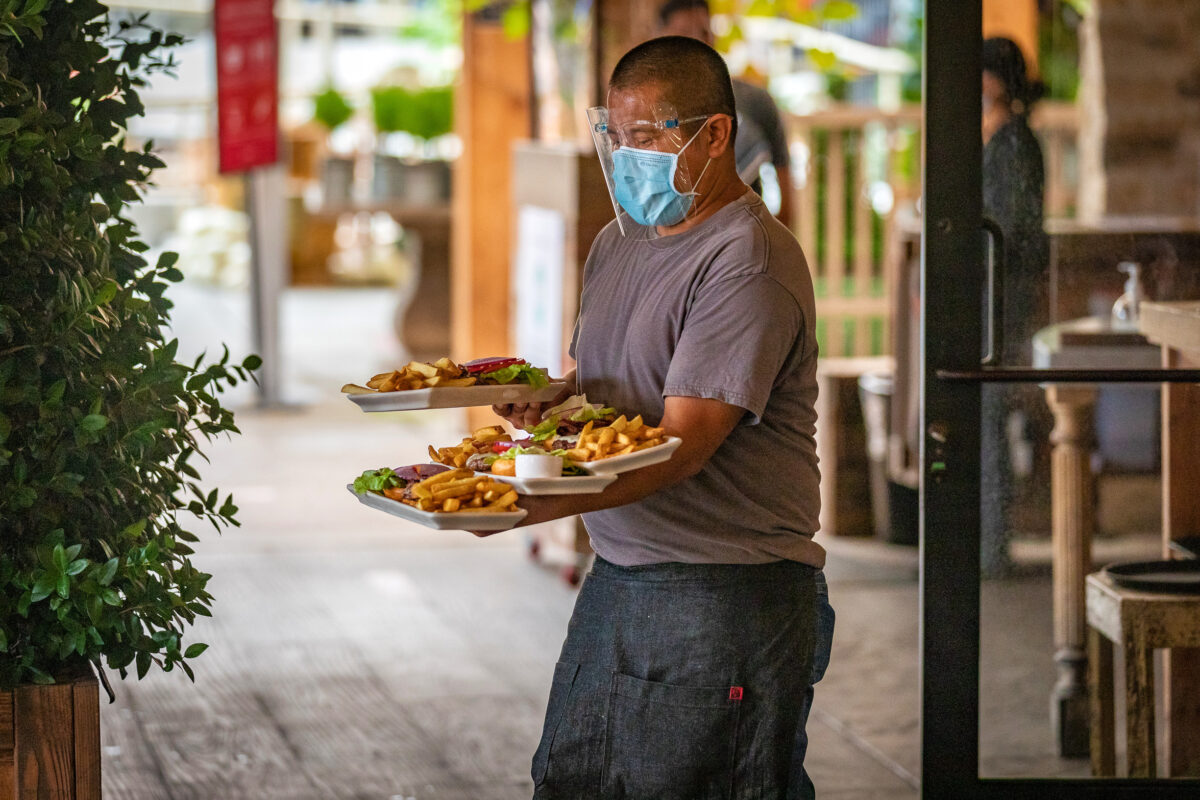Biggest Negative Impact of COVID-19 on Small Businesses Is in Accommodation and Food Services: Survey
New government data shows that the pandemic has had a moderate-to-large negative impact on over thre..
New government data shows that the pandemic has had a moderate-to-large negative impact on over three quarters of the nations small businesses, with the hardest-hit being those in accommodation and food services.
The most recent Small Business Pulse Survey, which collects real-time information on how small businesses are being impacted by the CCP (Chinese Communist Party) virus, featured data gathered from Sept. 6 to Sept. 12, the U.S. Census Bureau said in a release.
While the national average of small businesses that reported a “large negative impact” of the virus on operations stood at 30.9 percent in the reporting period, nearly 65 percent of small businesses in accommodation and food services said they have suffered a major blow.
 Restaurant owners protest lockdown restrictions near City Hall in New York City, N.Y., on Sept. 14, 2020. (Chung I Ho/The Epoch Times)
Restaurant owners protest lockdown restrictions near City Hall in New York City, N.Y., on Sept. 14, 2020. (Chung I Ho/The Epoch Times)Yavonne Sarber said she knew her Sugar Whisky Sis restaurant in Covington, Kentucky, wouldnt survive a government-ordered shutdown. So, she closed it for good and four weeks later opened an entirely new restaurant on the site, one focused on takeout and delivery.
“We couldnt sit still—we knew we had to do something,” Sarber said.
The Census Bureau figures follow a report from consumer review site Yelp, which said Wednesday that small businesses, particularly in restaurants and retail, continue to close their doors and lay off workers. The number of small businesses that have temporarily or permanently shut down has increased since mid-July, Yelp said, to more than 160,000, reversing a steady decline from the spring. Particularly hard-hit have been restaurants and bars, including dessert shops, burger joints, and sandwich shops. Restaurants that are more likely to deliver, such as pizza restaurants, have fared better.
Deniz and Yeliz Karafazli were ready to put the finishing touches on their Manhattan cafe, Madame Bonte, and expected to open it in March. But as the virus spread across New York City, the siblings couldnt get architects, air conditioner installers, and other workers to come to the restaurant.
The work was finally finished in July, allowing the cafe to open, although its business has been limited by the citys continuing ban on indoor dining. That ban will be partially eased starting Sept. 30 as officials allow restaurants to have indoor dining at 25 percent of capacity.
The cafe survived because the Karafazlis landlord and some of their vendors gave them a break on payments. And Deniz Karafazli is heartened by the fact the cafes menu lends itself to takeout, with sandwiches and coffee, and revenue has been better than he expected.
“It was the right place at the right time—once we opened,” he said.

 A waiter wearing protective face gear balances plates of food on his arms as he carries them to diners at a restaurant in Newport Beach, Calif., on Sept. 9, 2020. (John Fredricks/The Epoch Times)
A waiter wearing protective face gear balances plates of food on his arms as he carries them to diners at a restaurant in Newport Beach, Calif., on Sept. 9, 2020. (John Fredricks/The Epoch Times)A grim report from the beginning of September from the New York State Restaurant Association (pdf) found that, without some form of relief, 63.6 percent of restaurants in the state are likely or somewhat likely to shut down by the end of the year.
“It is painfully clear that without financial assistance, the restaurant industry in New York state could collapse,” Melissa Fleischut, the association president and CEO, said in a statement. “These recent survey results illustrate just how dire the financial situation has become for most restaurants, and it shows how critical it is that elected officials understand the urgency of the situation.”
The report also found that nearly 90 percent of New Yorks restaurant owners said that it will be very or somewhat unlikely that they will turn a profit within the next six months.
Census Bureau data showed that just 1.7 percent of small businesses in the accommodation and food services sector reported a large positive impact on operations amid the pandemic, while 3 percent said they experienced a “moderate positive effect.”
While small businesses that rely on walk-in traffic face grim prospects, those that have managed to adjust operations to take advantage of the surge in online purchasing have fared better.
Julie Campbell, who launched Pasted Paper in February, said she had to rethink her new wallpaper business before she could sell her first sheet. The pandemic forced the cancellation of the trade shows where she expected to introduce her wallpaper to prospective retail customers. She said that to save her fledgling company from ruin, she had to quickly learn online selling and marketing skills and transform the business to sell directly to consumers.
“I had so much inventory and I needed to sell it. I was forced to figure this outRead More – Source

